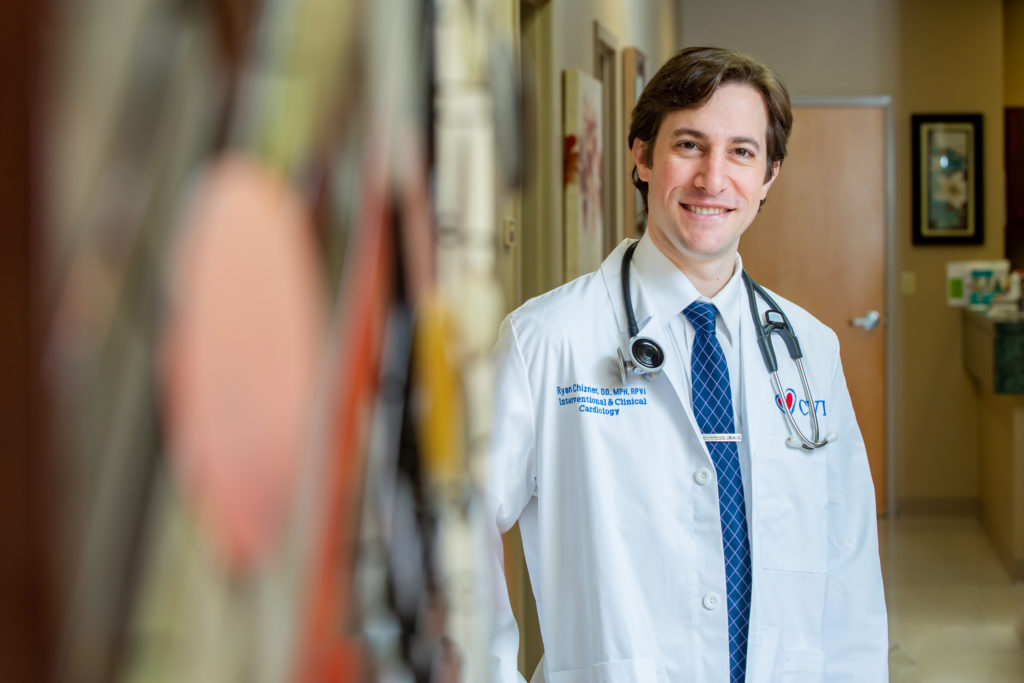Dr. Ryan Chizner is an interventional and clinical cardiologist who embraces compassionate, comprehensive care, and promoting a healthy lifestyle with his patients.
 If you live in Marion County, you’re more likely to suffer from heart disease than any other health problem. In fact, the leading cause of death for all races and ethnicities from 2013-2017 was heart disease, according to the Florida Health Marion County/Well Florida Council’s 2019 Community Health Assessment. That mirrors Florida as a whole.
If you live in Marion County, you’re more likely to suffer from heart disease than any other health problem. In fact, the leading cause of death for all races and ethnicities from 2013-2017 was heart disease, according to the Florida Health Marion County/Well Florida Council’s 2019 Community Health Assessment. That mirrors Florida as a whole.
Among life’s challenges is maintaining good heart health. Contributing factors that make cardiovascular diseases the leading cause of death in the United States are diabetes, obesity and a growing population of the elderly, according to the American Heart Association.
To expand its already comprehensive levels of care in the area, the Cardiovascular Institute of Central Florida (CVI), with offices in Ocala and The Villages, recently welcomed Dr. Ryan Chizner, DO, MPH, RPVI, to its team of professionals. Dr. Chizner specializes in clinical and interventional cardiology.
He is a quadruple board-certified interventional and clinical cardiologist and was a clinical assistant professor at Nova Southeastern University. He is the co-author of the book Cardiac Drugs Made Ridiculously Simple, which, according to CVI, is the No. 1 new release in the cardiology category on Amazon.com.
Dr. Chizner is also bilingual in English and Spanish, which helps him communicate with patients of varied backgrounds.
Dr. Chizner recently shared information about the institute, his background, his philosophy and some technological advances in cardiovascular care.
Tell us about the institute.
The Cardiovascular Institute of Central Florida is a multi-specialty group of experienced, board-certified cardiologists who use the latest technological advances available in cardiology today. Our cardiology services include cardiac wellness and prevention as well as diagnosis and treatment of cardiovascular disease, including coronary artery disease, valve disease, hypertension, heart rhythm conditions, congestive heart failure and more.
Please tell us a bit about you personally.
I was born and raised in Florida and wanted to become a doctor from early childhood. I enjoy the science of medicine because it is intellectually stimulating, and I love the art of medicine because it affords me the opportunity to connect with my patients on a personal level to provide comfort and care at a vulnerable time in their lives.
It has been my enduring passion to provide the highest quality of care, comfort and support in the delivery of state-of-the-art comprehensive cardiology services to my community. As a product of South Florida, I had the great privilege of delivering medical care to a diverse population, and in the process developed a fluency in medical Spanish to better communicate with my patients.
Do you work in Ocala and The Villages?
I began practicing clinical and interventional cardiology in Ocala when I joined CVI in September. My office is in the medical office building adjacent to West Marion Community Hospital in Ocala. As my practice builds and grows, I plan to expand to deliver compassionate cardiology services in The Villages community as well.
What are the differences between cardiology and interventional cardiology?
Clinical cardiology is the practice of prevention, diagnostic evaluation and medical management of heart diseases. Interventional cardiology is the practice of performing procedures, such as a heart catheterization and implanting stents in the arteries.
You are certified in adult comprehensive echocardiography. What is that?
An echocardiogram (“echo”) is a non-invasive heart ultrasound examination used to study the heart valves, heart muscle and major blood vessels in the body. A common use of echocardiography is to evaluate the strength of the heart pump. A weak heart seen on echo helps make the diagnosis of heart failure. An echo is also frequently used to look for blood clots, holes or infection on the valves or chambers of the heart.
What are some of the latest advances in your specialty?
The latest medical and invasive therapies control risk factors and improve survival in heart diseases. Newer stent technology allows shorter duration of blood thinners and allows the arteries to stay open longer with improved quality of life. An exciting advancement in interventional cardiology is the development of the temporary artificial heart pump (Impella). This specialized device, inserted in the groin, is used in patients who suddenly become critically ill as a result of a heart attack and require help to maintain their blood pressure while the patient’s body recovers.
Who is your typical patient, and at what point do they seek care?
Any person experiencing symptoms or signs suggestive of heart disease should seek an evaluation from a board-certified clinical and interventional cardiologist. These symptoms can include chest pain or discomfort, shortness of breath, palpitations, dizziness or fainting, and leg pain or swelling.
Abnormal signs of heart disease include any abnormality found by physical examination including blood pressure, heart murmur, change in heart rhythm, electrocardiogram (EKG), echocardiogram, heart scan, stress test or other laboratory or imaging tests.
What are some tips for cardiac wellness and prevention?
The most important, but not necessarily easiest, way to stay healthy and avoid needing a cardiologist is maintaining a healthy lifestyle. Healthy behaviors include a diet heavy in fresh fruits and vegetables, routine physical activity, healthy weight, tobacco avoidance and stress management.
Why do you feel what you do is so important?
To me, there is no greater opportunity, responsibility or calling than to be a physician, a healer. Cardiology is my passion because of the physical, spiritual and emotional meaning it provides in prolonging life and improving quality of life.
The Cardiovascular Institute of Central Florida › 4600 SW 46th Ct, Suite 250, Ocala, FL 34474 ›
(352) 622-4251 › www.cvicfl.com






